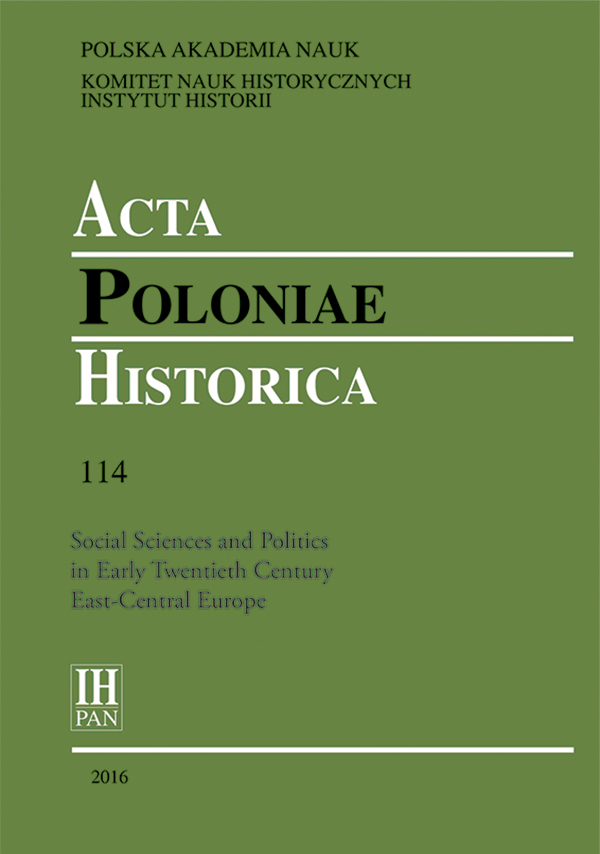Scientific Ideals and Political Engagement: Polish Ethnology and the ‘Ethnic Question’ Between the Wars
DOI:
https://doi.org/10.12775/APH.2016.114.01Keywords
ethnology, expertise, ethnic question, knowledge, objectivity, Eastern GaliciaAbstract
The article brings to light the relationship between politics and social sciences in interwar Poland in its local and transnational dimensions. It explores the beginnings of expertise in ethnology and the evolution of the discipline’s tools and methods as closely linked to the political goals of the interwar Polish state, and the post-coup Sanacja [Sanation] regime in particular. Ethnologists carried out fieldwork focused on multiethnic territories, such as Eastern Galicia, which were subjected to international territorial disputes. The collaboration with politicians and the administration – developed mostly in the framework of research institutes – was a source of inspiration and, at the same time, stiff competition between scientific schools. To illustrate some consequences of this collaboration, the article traces an argument over scientific approaches to the ‘ethnic question’ which involved ethnologists and empirical sociologists, and the connection of this argument to the objectivity principle in science. These different approaches reflect international theoretical and epistemological divisions at the time as much as they show the direct and indirect exchange of ideas within the European scholarship.References
Barth Fredrik et al. (eds.), One Discipline, Four Ways: British, German, French, and American Anthropology (Chicago, 2005).
Biedrzycka Agnieszka (ed.), Kalendarium Lwowa 1918–1939 (Kraków, 2012).
Dabrowski Patrice, ‘Borderland Encounters in the Carpathian Mountains and their Impact on Identity Formation’, in Omer Bartov and Eric D. Weitz (eds.), Shatterzone of Empires: Coexistence and Violence in the German, Habsburg, Russian, and Ottoman Borderlands (Bloomington and Indianapolis, 2013), 193–208.
Engelking Anna, ‘Ekspedycja etnosocjologiczna Józefa Obrębskiego w latach 1934–1937. Organizacja, metody badań, problematyka, uczestnicy’, Etnografia Polska, xlv, 1–2 (2001), 23–46.
Engelking Anna and Olga Linkiewicz, ‘Jan Falkowski (1901 – ok. 1940)’, in Anna Spiss and Zofia Szromba-Rysowa (eds.), Etnografowie i ludoznawcy polscy: Sylwetki, szkice biograficzne, iii (Wrocław and Kraków, 2010), 61–72.
Grott Olgierd, Instytut Badań Spraw Narodowościowych i Komisja Naukowych Badań Ziem Wschodnich w planowaniu polityki II Rzeczypospolitej Polskiej na Kresach Wschodnich (Kraków, 2013).
Kohlrausch Martin et al. (eds.), Expert Cultures in Central Eastern Europe, The Internationalization of Knowledge and the Transformation of Nation States since World War I (Osnabrück, 2010).
Linkiewicz Olga, ‘Applied Modern Science and the Self-Politicization of Racial Anthropology in Interwar Poland’, Ab Imperio, 2 (2016), 153–81.
Novick Peter, That Noble Dream: The “Objectivity” Question and the American Historical Profession (Cambridge, 1998 [2007]).
Paprocka Wanda, ‘Instytucje i organizacje polskie na Kresach Wschodnich 1920– 1939’, Etnografia Polska, xlv, 1–2 (2001), 9–22.
Stach Stephan, ‘The Institute for Nationality Research (1921–1939): A Think Tank for Minority Politics in Poland?’, in Yvonne Kleinmann et al. (eds.), Religion in the Mirror of Law. Eastern European Perspectives from the Early Modern Period to 1939 (Frankfurt am Main, 2015), 149–79.
Wagner Peter et al. (eds.), Discourses on Society: The Shaping of the Social Science Disciplines (Dordrecht and Boston, 1991).
Wagner Peter, ‘The Uses of Social Sciences’, in Theodore M. Porter and Dorothy Ross (eds.), The Cambridge History of Science (Cambridge, 2014), <http://dx.doi. org/10.1017/CHOL9780521594424.031> [Accessed: 20 Sept. 2016], 535–52.
Downloads
Published
How to Cite
Issue
Section
License
Title, logo and layout of journal are reserved trademarks of APH.Stats
Number of views and downloads: 538
Number of citations: 7



